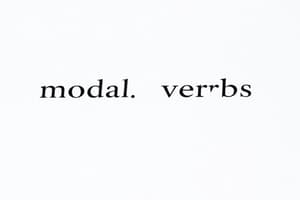Podcast
Questions and Answers
Which modal verb expresses ability and possibility?
Which modal verb expresses ability and possibility?
- Must
- Might
- Could (correct)
- May
What does the modal verb 'may' typically express?
What does the modal verb 'may' typically express?
- Obligation
- Certainty
- Probability (correct)
- Necessity
When discussing past possibilities, which modal verb is commonly used?
When discussing past possibilities, which modal verb is commonly used?
- May
- Can
- Must
- Might (correct)
In the sentence 'I can go out now,' what does 'can' signify?
In the sentence 'I can go out now,' what does 'can' signify?
Which modal verb indicates certainty and necessity?
Which modal verb indicates certainty and necessity?
Which modal verb is often used to emphasize urgency?
Which modal verb is often used to emphasize urgency?
Flashcards are hidden until you start studying
Study Notes
Modal Verbs
Modal verbs are a type of verb that expresses ability, permission, necessity, possibility, probability, obligation, etc. These verbs do not take any direct objects; instead, they carry meaning along with their base form, which is usually an infinitive phrase starting with 'to'. Some common modal verbs include:
- Can - Ability, Possibility
- Could - Permission, Past Possibility
- May - Probability, Obligation
- Might - Necessity, Obligation
- Must - Certainty, Necessity
For example, you can say, "I can go out now," indicating your current capability to leave. If someone asks if it's possible to fly without wings, one would respond, "You couldn't." Here, "couldn't" tells us what is impossible or past possibility. When discussing something that needs to happen, we often hear phrases like "we must act quickly" to emphasize its urgency.
These modals exist because languages need ways to talk about events occurring around us, so they have developed various forms of expression beyond basic action verbs. They help establish context within sentences and convey meanings such as competence, volition, certainty, etc., making them essential components of effective communication.
Studying That Suits You
Use AI to generate personalized quizzes and flashcards to suit your learning preferences.




